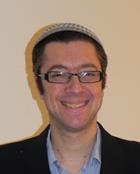Meet our faculty - Dr. Emanuele Dalla Torre
 Dr. Emanuele Dalla Torre (35),born in Milan, Italy, was exposed to science and specifically to physics from childhood, as his father was an engineer and his mother a teacher. To him, physics is a mathematical description of reality. “It’s about understanding how the world works. Mathematicians ask how things could have worked;.Engineers ask how to make things work. Physicists live on the thin line between theory and experiment. To be a successful physicist, you have to productively combine the two.”
Dr. Emanuele Dalla Torre (35),born in Milan, Italy, was exposed to science and specifically to physics from childhood, as his father was an engineer and his mother a teacher. To him, physics is a mathematical description of reality. “It’s about understanding how the world works. Mathematicians ask how things could have worked;.Engineers ask how to make things work. Physicists live on the thin line between theory and experiment. To be a successful physicist, you have to productively combine the two.”
Growing up in a Mesorati (traditional) Jewish family, he came to Israel after graduating high school for a one-year Yeshiva program with Bnei Akiva. “I was going to stay for a year and then go back to Italy and apply to the famous Politecnico di Milano engineering school,” shares Dalla Torre, “but that year left such strong impressions with me, I decided to stay another year and study physics at the Technion.” One more year turned into four, at the end of which he married Myriam and vowed to her not to leave the country against her wishes. He completed his MSc and PhD in the Weizmann Institute for Science, following this up with a post-doctoral fellowship at Harvard, an experience about which he has mixed feelings. “Professionally, it was wonderful. Harvard has many young researchers, all of whom abide by the rule of ‘publish or perish’. So academically and scientifically, it was a very productive time for me. Socially, it was not easy. Financially it was awful. We couldn’t wait to get back to Israel. Today Emanuele, Myriam and their three children reside in Givat Shmuel, a walking distance from the BIU campus, where he has been a Senior Researcher in the Physics Department since 2014.
An Alon Fellow, Dalla Torre’s research focuses on the theoretical non-equilibrium many-body physics. Equilibrium systems include ice in icicles or water in lakes. Analyzing their physical attributes is easy. But an avalanche or car traffic on the highway are non-equilibrium systems that are nearly impossible to analyze. Dr. Dalla Torre and his team are trying to develop a mathematical solution for such situations. They focus on the general movement of the volume of bodies, regardless of the exact location of each particle.


When asked which of his studies he considers most significant, Dalla Torre, who has won numerous prestigious awards and acknowledgements, protests: “What do you mean?! Each and every one of my studies is highly significant! I wouldn’t have published it otherwise! I can tell you which article is the most cited, or which was published in a more notable publication, but they are all equally important to me.” Nevertheless, he freely admits that his favorite course while studying was analytical mechanics, since “that’s where you realize you can describe the entire universe without ever having to use the words ‘force’ or ‘acceleration’, two terms that were the foundation to any physics I learned up until then.”
Dalla Torre considered his professional role model to be Albert Einstein, the man who he feels “managed to turn science into a commonly liked subject.” And, of course, Einstein was also a physicist. And just as his role model revolutionized scientific thinking, Dalla Torre reaches high and far, and he is well aware of the obstacles he may face: “I’ve always loved physics. I enjoy the initial dread of approaching a new problem. You never know what the solution will turn out to be. But in the end, when you have the whole picture in front of you, you know you've got it. And all that’s left to do is convince your colleagues and the scientific world. In my experience, physicists are exceedingly smart and hard to convince. But if you feel you have the answer, it can be done.”



